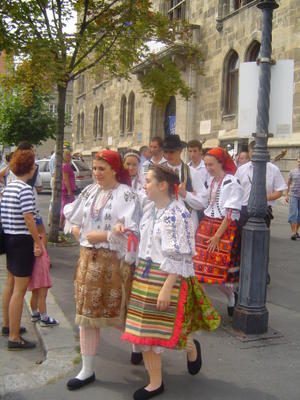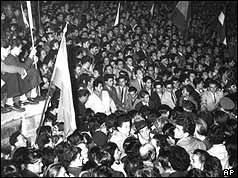After turning in my NSF grant proposal to my committee members, I took this afternoon to think about some different things—as my mind needed a break from my dissertation and all things having to do with water. Yesterdays memorial of the 1956 Hungarian revolution (where the US and the Western European powers failed to assist the revolutionaries—Im not making a judgment here as to whether they should have or not, just stating that they didnt) and the ongoing war in Iraq have me thinking about why we, as in the US, go to war and how does a nation justly end a war. Is there a consistent logic to our use of military deployment over the past fifty years? And finally how does our use of military power allign with the Just War Theory, and what insights, if any, can this body of literature give us in how and when to end the war in Iraq.. For those of you who may not know, Just War Theory (or at least my interpretation of it) posits when military action by a state is justified. This theory, which is often thought to be a product of Greek, Roman and Christian ethics, largely developed by thinkers including Aristotle and Augustine, has been divided into three parts: 1) when is war justified; 2) just conduct in war; and 3) just ending of war.
While Im not a political theorist by training, although perhaps I am by nature, I play one on TV (or shall i say I like to dabble in amateurish political thought). Since I have left 818 Clarendon St. in Durham, where my upstairs neighbor, and friend, is a political theorist by training, I feel a need to fill the vast hole in my theoretical livelihood. Ive been meaning to read Michael Walzer's Just and Unjust Wars, but haven’t gotten to it yet, that darn dissertation keeps getting in the way. Anyways…. I was reading on Stanford’s political theory website under Just War Theory, looking for insights into our Iraq situation and found a compilation of points that are needed for a just end to war put together by Brian Orend at The University of Waterloo in Canada. Dr. Orend received his PhD in political philosophy from Columbia and has authored a book entitled War and International Justice: A Kantian Perspective (Wilfrid Laurier University Press, 2000). I am directly quoting Brian from the website http://plato.stanford.edu/entries/war/#2:
„A review of the literature suggests something of a 10-point recipe for transforming a defeated aggressive regime into one which is minimally just:
- Adhere diligently to the laws of war during the regime take-down and occupation.
- Purge much of the old regime, and prosecute its war criminals.
- Disarm and demilitarize the society.
- Provide effective military and police security for the whole country.
- Work with a cross-section of locals on a new, rights-respecting constitution which features checks and balances.
- Allow other, non-state associations, or “civil society”, to flourish.
- Forego compensation and sanctions in favour of investing in and re-building the economy.
- If necessary, re-vamp educational curricula to purge past poisonous propaganda and cement new and better values.
- Ensure, in a timely fashion, that the benefits of the new order will be: 1) concrete; and 2) widely, and not narrowly, distributed. The bulk of the population must feel their lives after the regime change are clearly better than their former lives for the change to be sustainable.
- Follow an orderly, not-too-hasty exit strategy when the new regime can stand on its own two feet. Again, this will probably take a decade of intensive effort.”
While I must go find some food now as I am absolutely starving and I think Match closes soon, I will soon return to my thoughts on Brian’s list (some of which I agree with, some with I have problems with (e.g., "cement new and better values")), how it may or may not apply to the Iraq situation, and my thoughts on troop withdrawal (As of right now I am not in favor of a massive troop withdrawal, but support a massive troop realignment, with greater emphasis on Iraqi troop training, and infrastructure and civil society development). While I have extremely mixed thoughts about “Nation-Building” from the outside (from both a practical and ethical standpoint)--especially in region of such long-standing and complex religious, ethnic and political dynamics, and I never supported the war in Iraq, I feel that maintaining troops in Iraq is the only ethical choice at this point--although I do question our administration's ability in managing the "nation building" portion of the task, and strongly feel the first step forward is firing Rumsfeld. Off to buy some food, more on this later.
okay, now that i have eaten, worked on my dissertation for four hours, i am ready to continue. I have reviewed some interesting articles put out by the RAND institute (a think tank that is typically more conservative than I, although I think they have some great thinkers on staff). RAND has put together a study on US experiences of "nation building" in several countries including Germany, Japan, Somalia, Kosovo, Bosnia, Afghanistan and Haiti. After stepping through each of these "case studies", RAND includes a chapter of "lessons learned" from these experiences, including but not limited to: (1) multilateral approaches more complex but save money and resources; (2) multilateral approaches promote stronger regional acceptance and reconciliation; (3) the greater the number of occupying troups, the lower the level of casualties; (4) geographic neighbors should be brought on board to support "national building efforts"; (5) democratic transitioning takes a long time, 5 year minimum. This is just a summary of their chapter, if you want to read it yourself, it can be found here.
In addition to these conclusions of lessons learned, RAND developed a chapter on nation building in Iraq where they describe the many challenges of the current situation, including:
(1) Iraq has a limited (if any) democratic history including recent history of totalitarian rule.
(2) Limited sense of Iraqi identity--religious and ethnic identies often trump national identity.
(3) The Kurds and the Shi'a have historically been left out of political process, need to be brought into process.
(4) Deterioration of an Iraqi middle class due to past economic sanctions.
(5) Geographic neighbors of Iraq do not support US presence or goals.
(6) The split within the UN Security Council over war with Iraq
(7) Poor pre-war planning of post-war plans--little effort to bring international ngos and other members of civil society on board, international police forces etc.
To read the entire chapter click here. I generally agree that these challenges exist in Iraq as described by RAND. However, I think they have neglected one issue that is exremely important, Iraq's location in the broader context of Islamists and religio-ethnic extremists--by this I mean that islamists and extremists outside of Iraq may use the actions in Iraq as a symbol, direct or otherwise, to push their agendas and activities elsewhere.
I am off to bed now as it is nearing 1am. I will continue on with my thinking of what should be next in Iraq tomorrow. Im sure yall will be waiting on pins and needles for my oh-so-astute commentary. ha ha ha.
New Iraqi Survey
A recent survey (August 2005) conducted by the Britain's Ministry of Defense and reporter in the Telegraph came out on the 23rd October. The findings of the pole, which for right now Im assuming to be somewhat reliable, have made me rethink some of my thoughts on not supporting troop removal at this juncture. However, for now, I still stick by my position as desribed above (and below). The survey finds the following (and I quote directly):
"The survey was conducted by an Iraqi university research team that, for security reasons, was not told the data it compiled would be used by coalition forces. It reveals:
• Forty-five per cent of Iraqis believe attacks against British and American troops are justified - rising to 65 per cent in the British-controlled Maysan province;
• 82 per cent are "strongly opposed" to the presence of coalition troops;
• less than one per cent of the population believes coalition forces are responsible for any improvement in security;
• 67 per cent of Iraqis feel less secure because of the occupation;
• 43 per cent of Iraqis believe conditions for peace and stability have worsened;
• 72 per cent do not have confidence in the multi-national forces."
"Immediately after the war the coalition embarked on a campaign of reconstruction in which it hoped to improve the electricity supply and the quality of drinking water.
That appears to have failed, with the poll showing that 71 per cent of people rarely get safe clean water, 47 per cent never have enough electricity, 70 per cent say their sewerage system rarely works and 40 per cent of southern Iraqis are unemployed."
My Partial Solution to the Situation in Iraq
Im going to start tossing some ideas out there that I think will assist in the improvement in Iraq. These are not necessarily listed in order of importance, but follow the order in which they came to my mind.
(1) President Bush should deliver an honest address to the citizens of the U.S. recognizing mistakes in the process of the lead up to Iraq and the lack of post-war planning. This speech should be an expansion to his quotes regarding post-war Iraq “a miscalculation of what the conditions would be” that he made to a newspaper in the summer of 2004. Or more recently....“One of the lessons we learned from our experience in Iraq is that, while military personnel can be rapidly deployed anywhere in the world, the same is not true of US government civilians.” Unlike the speech he gave a couple of weeks ago to the National Endowment for Democracy, Bush must not obfuscate the Iraq war with the events of 9/11 but openly discuss the current situation and his vision for the future of Iraq and the US role in this future. Quarterly updates of the reconstruction process issued by the Department of State can be found here. To read the Bush speech given on October 6, 2005 regarding the war against terror and the war in Iraq, click here.
(2) "The goal of U.S. reconstruction assistance to Iraq is to help the Iraqi government develop a democratic, stable, and prosperous country, at peace with itself and its neighbors, a partner in the war against terrorism, enjoying the benefits of a free society and a market economy." (State Department Report, October 2005). President Bush needs to define the goal for Iraq in operational terms. Not just a "stable" and a "democratic" but an explanation of what these means and how one measures if Iraq is sufficiently "secure" and "democratic". I have yet to hear this goal clearly illuminated by the administration.
(3) Iraq reconstruction aid. In October of 2003 the US Congress approved a bill allotting $18.4 billion dollars in reconstruction aid to Iraq. The bulk of reconstruction contracts have gone to American owned and operated companies. While this may prove a windfall for certain American companies, it does little (perhaps some through Iraqi subcontracting) to help build the economy in Iraq. In addition, by hiring American companies through a closed-door non-competitive bid process, potentially adding costs to US taxpayers, this administration does little to dispel thoughts that the US went to war for purely self-interested economic reasons. The process of Iraqi reconstruction must be opened up to Iraqi companies to help secure the development of their economy and to aid in minimizing the global impression that the US went to war with Iraq solely to pursue its own economic interests (even if the war was instigated out of such self-interest).
(4) Increase use of NATO forces to help train Iraqi military. At the end of September, the New York Times reported that 26 nations in NATO were assisting in training activities of the Iraqi military. While the war in Iraq is largely unpopular in Europe, by continuing to work and strengthen our relations with these nations, much needed cooperation in Iraqi security forces may become more feasible.
(5) Use of UN forces to police the border between Syria and Iraq. It appears that most of the bombing inside Iraq are the responsbility of foreign fighters (according to Iraq. Gen. John P. Abizaid, commander of United States Central Command). Military efforts have increased along the border and according to a New York Times article on October 15th (behind the wall of Times select so I will not copy link). The article by By JAMES RISEN AND DAVID E. SANGER states "Some current and former officials add that the United States military is considering plans to conduct special operations inside Syria, using small covert teams for cross-border intelligence gathering." As the situation in Syria is heating up, particularly with the accusations of the plotted assasination of the former prime minister of Lebanon bythe Syrian President Bashar al-Assad. As to overextend our troops in Syria and to instigate a all-out Middle Eastern conflict, the placing of UN troops at the border of Iraq and Syria will help strengthen that border and hopefully reduce the level of suicide bombers getting into Iraq from Syria.
(6) Finance part of the reconstruction through a gas tax in the US (keeping the gas price at the post-Katrina level). While this is an extremely regressive tax, applying a tax directly to the amount of gas that we spend will provide an incentive in the US to conserve gasoline use and encourage the adoption of alternative fuel methods. By becoming less reliant on the oil reserves in the Middle East, we will be less prone to engage in costly military activity in the region. The New York Times recently wrote an editorial supporting such a gas tax. The editorial can be found here.
(7) Let the "stop loss" troops return to the States. "The "stop loss" orders mean personnel who could otherwise leave the military when their volunteer commitments expire will be forced to remain to the end of their overseas deployments and up to another 90 days after they come home." (USATODAY, January 5th, 2004). Some of these "stop loss" troops are becoming increasingly angry at the extensions that they are required to serve after their volunteer commitments have expired. Families are facing financial hardships due to the extensions beyond the contracts. The "Stop-Loss" policy must not be used as a means to cover over the shortage of troops.
(8) The constitutional voting results in Iraq are showing that the constitution will most likely be adopted, however, the votes in favor of the constitution were very much divided along ethnic lines, with the Shi'a and the Kurds largely in support and the Sunnis against. The Sunnis had 2/3rds no vote in two provinces (the voting required a 2/3 majority no in 3 provinces to not be approved). While the constitution is most likely going to be approved, this voting pattern suggests that further frustrations from the Sunnis in Iraq may occur, either through political (e.g., ammending constitution) or violent actions. While the relatively high turner is a good sign towards the acceptance and practive of democratic practices in Iraq, I predict claims of voter fraud in the


 National Theatre. Here are some pics. Some folks from the National Theatre above. Aslin in the red shirt, the guy with whom i travelled to Croatia. Real nice guy. Sandra (fulbright musician) and Stephanie (fulbright mathematician) eating cheese. After spending a week fiddling with the "NPR Math Puzzler", a complex (to me at least) math problem, i emailed it to Stephanie and she solved it in 3 hours, damn her. Unfortunately it was too late to send it in to win the prize from NPR. Gaby, below, is a med student in Budapest, she is of Argentinian descent, but grew up in LA and Isreal, served in the Isreali military then went to the University of Arizona.
National Theatre. Here are some pics. Some folks from the National Theatre above. Aslin in the red shirt, the guy with whom i travelled to Croatia. Real nice guy. Sandra (fulbright musician) and Stephanie (fulbright mathematician) eating cheese. After spending a week fiddling with the "NPR Math Puzzler", a complex (to me at least) math problem, i emailed it to Stephanie and she solved it in 3 hours, damn her. Unfortunately it was too late to send it in to win the prize from NPR. Gaby, below, is a med student in Budapest, she is of Argentinian descent, but grew up in LA and Isreal, served in the Isreali military then went to the University of Arizona.
















